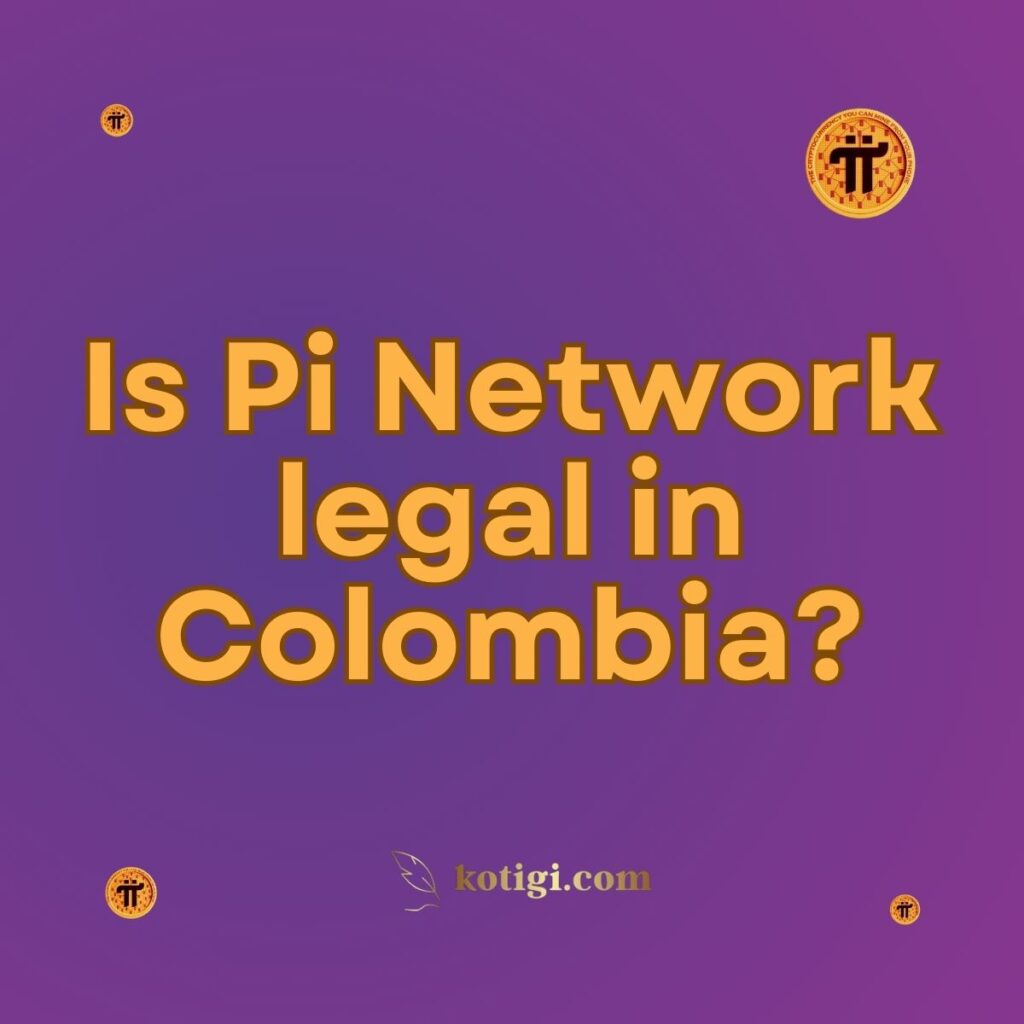
Is Pi Network legal in Colombia?
In Colombia, Pi Network is neither officially regulated nor banned. The country’s financial authorities, such as the Superintendence of Finance of Colombia, have issued general warnings about the risks associated with cryptocurrencies. However, Pi Network users can legally participate in mining and other activities, but should be cautious of evolving regulations around digital currencies.
Introduction
Colombia, like many countries in Latin America, is experiencing growing interest in cryptocurrencies. As more citizens engage with decentralized networks like Pi Network, questions about the legal status of such platforms arise. With the Colombian government having yet to establish clear regulations for most cryptocurrencies, the legality of Pi Network remains ambiguous, although not officially prohibited.
This article explores the current legal standing of Pi Network in Colombia, the country’s overall approach to cryptocurrency regulation, and what participants should consider before using or mining Pi in the country.
1. Colombia’s Stance on Cryptocurrencies
Colombia has not banned cryptocurrencies but has taken a cautious stance toward their use, issuing several warnings and advisories to the public.
1.1 Superintendence of Finance of Colombia’s View
The Superintendence of Finance of Colombia (SFC), the country’s primary financial regulator, has issued warnings that cryptocurrencies, including Bitcoin, are not considered legal tender. The regulator has emphasized that transactions involving digital currencies are not protected under Colombian law. However, this does not constitute a ban on cryptocurrency use, and Pi Network users are not restricted from participating in the platform.
1.2 Implications for Pi Network
Since Pi Network operates as a decentralized network and is not directly involved in financial transactions at this stage, the Colombian government’s warnings do not apply directly to its mining activities. Participants in Colombia can legally mine Pi coins, although they should remain cautious of the associated risks and any future regulatory changes.
1.3 Government Focus on Financial Integrity
Colombia’s authorities have a clear interest in maintaining financial stability and preventing fraud. Although Pi Network is currently allowed, users should keep in mind the government’s intent to regulate the digital economy more closely, especially concerning security, anti-money laundering (AML), and fraud prevention.
2. The Absence of Specific Cryptocurrency Regulations
While some countries have adopted clear regulations for cryptocurrencies, Colombia’s legal framework remains undeveloped in this area.
2.1 No Direct Regulation of Pi Network
As of 2024, Colombia has not enacted specific legislation targeting decentralized platforms like Pi Network. This allows Pi Network to operate freely in the country. Users are not subject to any special laws governing their participation, but they should be mindful of future regulatory developments.
2.2 Legal Uncertainty Around Cryptocurrencies
The lack of specific laws regulating Pi Network in Colombia creates a legal gray zone. While Pi is currently legal, the absence of a clear framework makes it difficult to predict how future laws may impact the network and its users.
2.3 Potential for Future Restrictions
Given the Colombian government’s growing interest in digital currencies and their potential impact on the financial system, it is possible that new regulations could be introduced. These might place restrictions on how cryptocurrencies like Pi are mined, traded, or transferred within the country.
3. Potential Regulatory Risks for Pi Network Users in Colombia
Although Pi Network is not currently restricted, there are potential risks associated with participating in decentralized digital platforms in Colombia.
3.1 Unregulated Nature of Cryptocurrencies
Since Pi Network is not officially regulated, users should be cautious of the risks involved. The SFC’s warnings suggest that any losses or issues related to cryptocurrency transactions will not be protected by the government. Pi users should be aware that they are operating in an unregulated environment, which carries its own financial and legal risks.
3.2 Future Legal Challenges
If Colombia adopts more stringent cryptocurrency regulations in the future, Pi Network users may face new legal challenges. These could range from restrictions on mining to limitations on the use or trading of Pi coins. It is important for users to stay updated on legal developments to ensure compliance with any new regulations.
3.3 Potential Tax Implications
Colombia’s tax authority, the Dirección de Impuestos y Aduanas Nacionales (DIAN), has signaled its intent to regulate and tax cryptocurrency-related activities. Although specific guidelines for Pi Network users have not been established, participants should be aware of the potential for future tax obligations, especially as the network transitions into a more tradeable currency.
4. Colombian Cryptocurrency Regulation Trends
As the use of digital currencies grows in Colombia, the government is likely to implement clearer regulations for cryptocurrencies, which could affect Pi Network.
4.1 Colombia’s Regulatory Path for Cryptocurrencies
Colombia has been moving toward a more structured regulatory approach for cryptocurrencies. In 2021, the government introduced a sandbox environment that allows businesses to test cryptocurrency-related services under close regulatory oversight. Although Pi Network does not fall under this initiative, the move indicates Colombia’s intent to introduce more comprehensive crypto regulations in the future.
4.2 International Influence on Colombian Policies
Colombia is likely to align its cryptocurrency regulations with international standards. As countries around the world, particularly those in the European Union and North America, adopt stricter cryptocurrency regulations, Colombia may follow suit to ensure its financial system remains compliant with global norms. This could impact Pi Network’s legal status, depending on the specifics of future laws.
4.3 The Role of Colombia’s Financial Technology Association (Colombia Fintech)
Colombia Fintech, the association representing the fintech and cryptocurrency industries in the country, has been pushing for clearer regulations that would support the growth of digital currencies while protecting users. Pi Network could benefit from these efforts if more favorable regulations are implemented.
5. Pi Network’s Global Approach to Compliance
Pi Network’s international presence means that it has to account for various regulatory frameworks around the world, including Colombia.
5.1 Pi Network’s Know Your Customer (KYC) Process
Pi Network has implemented a Know Your Customer (KYC) process to verify user identities, which could help it comply with future regulations in Colombia. This KYC process aligns Pi Network with global standards and ensures that it is taking steps to prevent fraud and money laundering. As Colombia’s regulations develop, this process could help Pi Network maintain legal compliance within the country.
5.2 Data Privacy and Compliance with Colombian Law
Pi Network users in Colombia should also be aware of the country’s data protection laws. Colombia’s Statutory Law on Data Protection requires companies to adhere to strict guidelines on data collection, storage, and usage. Pi Network’s KYC process and privacy policies are designed to comply with global data protection standards, but users should ensure that their personal information is protected in accordance with Colombian law.
5.3 Collaboration with Local Regulators
As Pi Network continues to expand, it may seek to collaborate with Colombian regulators to ensure its platform remains compliant with local laws. This could involve sharing information with the government or adjusting its operations to meet any new legal requirements that arise.
6. What Pi Network Users in Colombia Should Consider?
While Pi Network is legal in Colombia for now, users should be mindful of the potential regulatory changes that could affect their participation.
6.1 Stay Updated on Regulatory Changes
Colombian users of Pi Network should stay informed about any new cryptocurrency laws or regulations. As the government continues to assess the risks and benefits of digital currencies, it may introduce new laws that could impact Pi Network’s operations or user activities. Staying up-to-date on these developments will help users navigate the legal landscape more effectively.
6.2 Be Cautious with Future Transactions
Although mining Pi is currently allowed, future restrictions could affect how Pi coins can be used or traded within Colombia. Users should exercise caution when engaging in transactions involving Pi coins and ensure that they are compliant with any future regulations.
6.3 Protect Personal Data
Data privacy is a critical consideration for Pi Network users in Colombia. While Pi Network’s KYC process helps protect personal information, users should ensure that they comply with Colombian data protection laws. Taking additional steps to safeguard their personal data can help prevent legal issues in the future.
Conclusion
Pi Network is currently legal in Colombia, but the country’s cautious approach to cryptocurrency regulation suggests that future restrictions may be imposed. While users can freely participate in Pi Network activities, they should remain aware of the legal risks associated with the unregulated nature of cryptocurrencies in Colombia. Staying informed about regulatory developments and protecting personal data are essential for users looking to continue their engagement with Pi Network in the future.
Key Takeaways
- Pi Network is not banned or restricted in Colombia, but cryptocurrencies are not considered legal tender under Colombian law.
- The Superintendence of Finance of Colombia has issued warnings about the risks associated with cryptocurrencies, though no specific laws apply to Pi Network.
- Pi Network users in Colombia should be aware of potential future regulations that may impose restrictions on mining, trading, or using Pi coins.
- Pi Network’s KYC process aligns with global standards and may help users comply with future Colombian regulations.
- Users should stay informed about regulatory developments and ensure that their personal data is protected under Colombian law.





